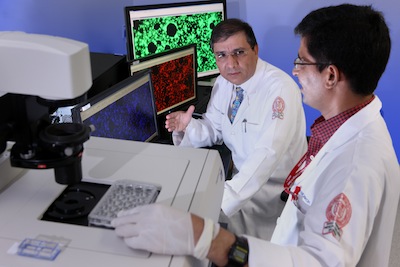Research helps to unlock secrets of recurring cancers
October, 2014

Dr. Konduru Sastry and Dr. Lotfi Chouchane demonstrated
the role of a certain protein in the survival and renewal of
some cancer cells.
Researchers at WCMC-Q have made a major step towards understanding why certain cancers often recur after they have been treated with conventional therapies.
The research, which focused on a specific protein that allows skin, prostate and breast cancers to regrow after initially successful treatment, paves the way for future studies that could lead to the development of a new generation of more effective anti-cancer drugs.
Led by WCMC-Q’s professor of genetic medicine & immunology, Dr. Lotfi Chouchane, the project is the result of a joint effort by researchers from WCMC-Q, Qatar Biomedical Research Institute (QBRI), and Sidra Medical and Research Center, all of which are Qatar Foundation member organizations. Additional contributions were made by medical institutions in China and the United States.
The study demonstrated the role of a protein, appropriately named ‘BAD protein’, in the survival and renewal of some cancer cells – known as cancer stem cells – which are able to resist even the most advanced anti-cancer drugs available today.
Dr. Chouchane explained: “The problem with existing cancer treatments is that they can target and kill most of the cancer cells, but they are not able to target the cancer stem cells. These cancer stem cells are only a small proportion of the total number of cancer cells, but they are very important because they are able to sustain tumor growth, which means the cancer comes back.
“We were able to show that the BAD protein not only plays a role in the survival of cancer stem cells, but that it is actually essential for their survival. This makes BAD an extremely attractive target for research for new, more effective cancer therapies.”
The study, entitled Targeting proapoptotic protein BAD inhibits survival and self-renewal of cancer stem cells, has now been published in the peer-reviewed scientific journal Cell Death and Differentiation, part of the prestigious Nature series of journals.
BAD stands for ‘Bcl2-Antagonist of cell Death’, where Bcl-2 refers to the name of the gene that encodes the protein. The protein is known as an ‘antagonist of cell death’ because in a different form it actually helps to kill cancer stem cells, but when it undergoes a common molecular process called phosphorylation its properties change and the protein then helps the deadly cells to survive and progress.
Laboratory tests performed by the team on cultivated melanoma, prostate and breast cancer cells showed a positive relationship between the levels of BAD protein and cancer stem cells. The study also found high expression levels of BAD protein in 83 per cent of breast cancer tumor specimens taken from patients. Additionally, the researchers discovered a positive correlation between BAD and prostate cancer progression, which suggests BAD plays a role in tumor advancement as well as tumor initiation. This means that future research could use BAD to develop a new way to monitor tumor progression as well as novel cancer therapies.
Major contributors to the project were Dr. Konduru Sastry, research associate in microbiology and immunology at WCMC-Q, and scientist Dr. Mariam Al Muftah of QBRI, while Sidra contributed the expertise of Dr. Francesco M. Marincola, Dr. Ena Wang and Dr. Awatef Ismail.
Dr. Chouchane said: “It was very pleasing that we were able to work with colleagues at QBRI and Sidra to produce this study and it shows the great progress that is being made by Qatar in the field of biomedical research.”
Dr. Khaled Machaca, WCMC-Q’s associate dean for research, said: “This study represents an important milestone in our understanding of cancer eradication and promises new therapeutic avenues. It is very encouraging and rewarding to have such important findings as the fruits of a multi-institution collaboration among multiple entities within the Qatar Foundation family. This fits squarely within the vision of the QF leadership to encourage collaborative efforts among research-focused institutions in Qatar. Such a collaborative effort between WCMC-Q, QBRI and Sidra offers a shining example of how successful such collaborations can be.”
Other contributors to the project were research specialist Ms. Moza Al Kowari and Dr. Abdelali Haoudi from QBRI; Ms. Dhanya Kizhakayil, laboratory specialist at WCMC-Q; Dr. George Kulik of Wake Forest University School of Medicine in North Carolina; and Dr. Pu Li of Shanghai Jiao Tong University School of Medicine in China.
Funding for the project was contributed by the Biomedical Research Program of Qatar Foundation, which supports the research effort at WCMC-Q, and by Qatar Biomedical Research Institute.
